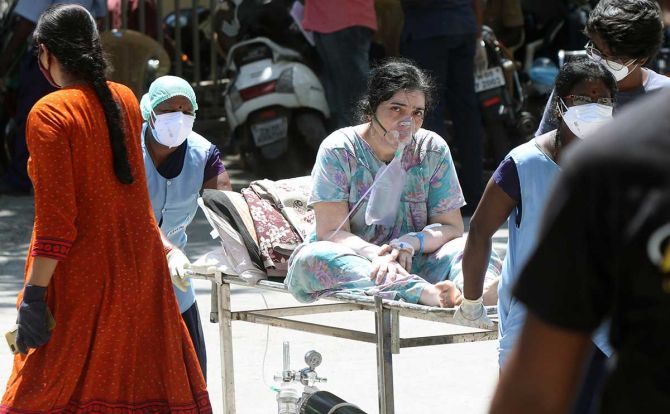Rather than worry about what picture of India is being painted in the foreign media, the focus must be on marshalling all our energies to provide relief and solace to our deeply wounded and dispirited citizens, says former foreign secretary Shyam Saran.

India is in the midst of a perfect storm.
Not only has the second wave of the pandemic brought death and tragedy to the doors of countless families, it has exposed the singular incapacity of the Indian State to deliver on the most basic needs of its citizens and uphold their right to health and to life, and, most importantly, in a democracy, to their right to human dignity in life and in death.
In this moment of deep crisis, we are literally on our own and dependent on the goodwill and sympathy of civil society, community organisations, and individual good samaritans.
The federal nature of the Indian polity was already being systematically eroded and the pandemic provided a golden opportunity to accelerate the process.
After all crisis management must be centrally coordinated, isn't it?
As soon as it became clear that it is unable to handle this ferocious second wave, the Centre has dumped the responsibility on the state governments.
The blame game has begun in right earnest with a senior minister absolving the central government of the mess we find ourselves in and claiming that the state governments were repeatedly warned of the impending second wave and asked to take a series of preventive actions.
But there is no mention of the prime minister's own remarks to the World Economic Forum on January 28, which suggested that India had brought the Covid beast to heel and was ready to teach the rest of the world a lesson or two.
The smug claim that India was the 'pharmacy of the world' and the dispenser of vaccines to rich and poor nations across its borders is now shredded.
The 'pharmacy' boasts empty shelves and seeks aid from others.
There is appalling brazenness in the decision to forge ahead with the vanity Central Vista project even while the citizens are in lockdown.
The juxtaposition of burning funeral pyres and, in parallel, the construction in indecent haste of a new parliament and a grand residence for the prime minister, evokes ugly precedents from history.
Accountability, so fundamental an attribute of democracy, has become a mere distraction.

I have earlier spoken about the success of the policy of deflection pursued by the current political dispensation.
This could be communal polarisation or shifting the blame to state governments or even to inimical external forces -- the perennial 'foreign hand' lurking in our midst.
But the scale and intensity of the crisis that is upon us makes camouflage impossible.
'Mirror, mirror on the wall' is reflecting the true and ugly picture of Dorian Gray from Oscar Wilde's famous novel.
Does conveying a message of being in control and delivering a swift and scathing riposte to any criticism that appears in the foreign, mainly Western, media make us less vulnerable as a country?
Or since domestic critics of the government are providing grist to foreign mills should they not be restrained?
The opposite is the case.
We can address our vulnerabilities only by acknowledging them.
And in the present case the serious fault-lines in our mechanisms of governance lie exposed for everyone to see.
There are now myriad means of transmission through which friend and adversary alike are being alerted to this reality.
Rather than worry about what picture of India is being painted in the foreign media, the focus must be on marshalling all our energies to provide relief and solace to our deeply wounded and dispirited citizens.
Image repair will follow.
What are some key faultlines that must be addressed swiftly?

One, the State should accord the highest priority to its some critical and indispensable responsibilities -- providing security to its citizens, and delivering on their right to health and education.
Over the past several years, governments, both at central and state level, have fallen relentlessly behind in delivering on each of these responsibilities.
The most rapidly growing and most profitable sectors in the Indian economy are private security, private education, and private healthcare.
The inability of the government to deliver these services efficiently should call for improving the mechanisms of delivery rather than abdicating responsibility and handing over the baton to the private corporate sector.
These services are in the nature of public goods where profit motive does not provide services when they are needed most.
Where the public good argument has been upheld, such as the All India Institute of Medical Sciences or Jawaharlal University, the results speak for themselves.
Two, government decision making must be evidence-based and subject to independent and critical evaluation.
Key policy decisions should be based on comprehensive and reliable data, which technology makes eminently possible today.
There should be carefully designed pilot projects to determine feasibility.
Creating public awareness must be part and parcel of project planning.
There must be independent evaluation after implementation to inculcate learnings for the future -- what works and what does not.

Three, India should not create an arbitrage economy which favours 'rents' rather than reward risk taking and entrepreneurship.
Before imposing controls and regulations the State must ensure that it has in place the administrative machinery and processes to implement them effectively.
The inability of the State to administer such policies creates opportunities for arbitrage income.
If money can be made more easily through such arbitrage, why should one invest in risky ventures?
This is widespread in the Indian economy and we witness its ugly consequences in the desperate search for oxygen, hospital beds, and critical medicines during our present predicament.
And lastly, there is no substitute for knowledge, for expertise, and professionalism.
We have blundered into this crisis by ignoring warnings from experts.
We have created an environment where the role of the professional is to validate a political preference.
We have allowed a steady regression into obscurantism instead of promoting the 'scientific temper' Pandit Nehru had spoken about.
We are still drawing from the intellectual capital he helped create. It is a wasting asset unless it is constantly renewed and upgraded.
Shyam Saran is a former foreign secretary and a senior fellow, Centre for Policy Research, a New Delhi-based think-tank.
Feature Presentation: Ashish Narsale/Rediff.com












 © 2025
© 2025